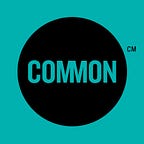Maverick Series: Going Back Through The Window
Meet Charles Harrison, an expert in market research and corporate strategy. We got a chance to chat with Charles about his unusual career path, how bias can be beneficial, and what social enterprises need to learn from traditional business strategy.
Q: What has your career path looked like, and how did you end up doing what you do now, and with COMMON?
A: I got into marketing through chance, actually. I’ve always liked working with my hands, and I spent the early parts of my career finding ways to do that- as a cook and an auto mechanic, among other things.
While I was working with a small car shop, the owner started working on expansion. He just wanted to take his business from one shop to five, and he’d ask my opinion on planning, presentations, etc. I started taking the tactics and strategy, making them my own, and going from there. I got lucky, because my boss took a gamble on me and gave me free reign.
Ultimately, my work with that company inspired me to go back to school, where I worked on a research agenda about corporate responsibility with a professor. I started to really find my passion then, in working with creative agencies, design firms, advertising agencies, and other places where traditional business strategy collided with the creative world. I found that while a lot of places do what they can philanthropically, there were bigger opportunities to set up strategically.
I found my way to COMMON from some of the work that has come out of it- innovation, advertising, and the focus on purpose-driven brands. These were all things that I flagged a long time ago, and COMMON represents to me a way to go back to those flags, those bookmarks, or folders of bookmarks (laughs) that I know mean good work.
Q: What do you want to do as part of the COMMON community?
A: What I do is look at what the data says, and look at what consumers are actually doing, and take into consideration what everyone claims they’re doing, and try to find what’s unique to a brand, to a business, to an industry, and make it useful to marketing, communications, the bottom line, and to the consumers lives.
I’m looking forward to using my capabilities in market research, strategy, consumer insights, things of that nature, to help the COMMON community. I’ve found that when the business goal is to do well by doing good things, that the challenges are a little more tractable, and the issues are more rewarding in general. It’s definitely nice to be in a place where there are like-minded individuals- in many ways we’re not like-minded, but we’re all working towards a common theme.
Q: What should social enterprises be thinking about when it comes to strategy?
A: Social businesses are driven by people that have society on their minds, and sometimes they can put the business strategy on the back-burner. There’s a classic “nonprofits are nonprofits because they don’t know how to run businesses” mentality, and even though that’s extreme, to some extent there’s a tendency to put more weight on how we’re contributing positively to the world, as opposed to how we’re going to make payroll.
Secondly, there’s a difficulty with regard to branding. Social enterprises need to clearly outline how they contribute positively to society, and decide whether that’s going to be a core tenant in their presentation to consumers. Furthermore, you still need to have a core value proposition in place- you can’t solely depend on giving your consumers a warm and fuzzy glow because of your company purpose, you need to deliver a quality product or service.
Thirdly, social enterprises need to be specific in what they’re trying to accomplish, and target the right people. There’s a kind of frenzy around doing good that often doesn’t hold up to critical attention, and there’s a sense of consumers feeling green-washed and feeling pressured to constantly contribute money to blanket-term causes, without actually knowing where their cash is going or what it’s going to be used for. We’re looking at an increasingly democracy-driven economy now, where the crowd is taking control. I think monopolies will start to fade as a result, but social enterprises will have to step up their game in order to successfully pick up consumer attention.
Q: Any other words of advice?
People are still people. I’ve never been shy to reach out to someone, just to say hello. Someone might think i’m interesting, and they want to talk great. If not, I’ll move on. That attitude has gotten me to where I am today. That, and an old saying- “if you get kicked out of the front door at a party, go back in through the window”. The world right now is a cultural failure, and it’s best to just embrace it. For me, that’s inspiring. It gives us a starting point when we can admit that what we’ve been doing hasn’t worked. So I’m going back in through the window, to change it.
Like This? Sign Up For Our Newsletter.
About this series: COMMON Mavericks features conversations with professionals about the work they are doing to take care of the planet and all the creatures on it.
COMMON is a creative accelerator for social businesses and projects, designed to build, launch, and promote products and ideas that take care of the planet and all the creatures on it.
Visit www.common.is
Follow us on TwitterL @commonworks
Write us at: itmatters@common.is
